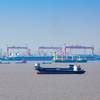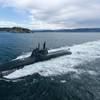The record $2.2 trillion U.S. budget proposal is out, and, predictably, the political posturing and positioning for additional dollars has begun in earnest. This year's budget from the President, with its heavy emphasis on defense and homeland security, has outraged a broad spectrum of the inland waterways industry, based on comments delivered by influential organizations in the immediate aftermath of its release.
The $2.2 trillion budget includes $380 billion for the nation's military, a $15 billion (4.2%) increase. The new budget provides $41 billion for total homeland security spending. Excluding Department of Defense spending, the budget includes $35 billion for homeland security, a $2.5 billion or 7.6% increase that more than doubles funding over the past two years.
How will the budget affect your business in the coming year? Following are the immediate reactions from the organizations paid to support your interests in Washington, D.C.
Waterways Work!
"News of the President's budget request has stunned the waterborne transportation industry," said Dennis Kirwin, President of Waterways Work! "We will take all appropriate steps to urge Congress to reject this misguided proposal."
According to the organization, President Bush's FY2004 budget request proposes that between 25 and 50 percent of the cost to operate and maintain the nation's inland waterways be paid for by the Inland Waterways Trust Fund. This unprecedented proposal, if enacted, would have a devastating impact on a vital transportation sector at a time when the economy is struggling to recover. The barge and towing industry, which uses the nation's waterways to transport essential bulk commodities such as coal, grain, petroleum and chemicals valued at more than $31 billion annually, already pays a diesel fuel tax of 20 cents per gallon into the Trust Fund under landmark cost-sharing legislation enacted in 1986. These funds, after being matched by general revenue funds from the federal government, have been dedicated by law to underwrite the cost of constructing locks and dams on the inland waterway system and major rehabilitation. Unfortunately, instead of being used immediately as originally intended to rebuild Congressionally approved inland projects, more than $400 million in inland Trust Fund receipts have been allowed to accumulate and remain unspent in the Trust Fund. While not the sole user of the waterways, the barge and towing industry is the only segment of users that pays for the modernization of the waterways' infrastructure. In addition to the 20 cents per gallon, barge companies also pay an additional 4.3 cents per gallon diesel fuel tax, which is deposited into general revenues. As slated under the new budget request, for the first time a portion of the Harbor Maintenance Trust Fund would also be used for waterways improvements as well as for operations and maintenance of the nation's coastal ports.
American Association of
Port Authorities (AAPA)
AAPA praised the Administration's budget plan for the coming fiscal year for its allocations for U.S. Customs Service and Coast Guard programs. However, because the Administration's budget plan lacks designated funds for key port security initiatives and would shift the Federal share of navigation channel construction from general funds to the Harbor Maintenance Trust Fund, the association that represents the interests of U.S. port authorities expressed concern. The U.S. system of ports handles 95 percent of the overseas cargo trade for the country. AAPA praised the Bush budget for its funding of several Customs and Coast Guard programs, including $62 million for Customs' Container Security Initiative, $307 million additional investment in Customs' Automated Commercial Environment, an additional $119 million for Customs' nonintrusive inspection technology (including equipment for ports), $18 million for the Customs-Trade Partnership Against Terrorism and a 10 percent increase in Coast Guard budget.
"Historically, America's ports have operated via partnerships between U.S. Customs and the Coast Guard. Ports derive considerable benefit from their programs being appropriately funded," said Kurt J. Nagle, president of the American Association of Port Authorities. AAPA also praised the proposed $1 billion Infrastructure Performance and Maintenance initiative included in the transportation budget to jump start ready-to-go projects. "Many of these projects could serve the dual purpose of addressing freight congestion as well as creating a significant number of new jobs," said Mr. Nagle.
However, with regard to the budget's insufficient port security funding, Mr. Nagle said, "The nation's ports remain without Federal help that is necessary to secure U.S. water borders. While we had been hopeful the budget would include money specifically for port facility security grants, we find ourselves disappointed."
To date, less than $200 million in Federal funds has been announced for port security grants -- only about one-fifth of the amount the Coast Guard estimates is required just for first-year costs for port security equipment and personnel, Nagle said. U.S. Coast Guard estimates, released in December in connection with passage of the Maritime Transportation Security Act, placed first-year port security costs at $963 million, followed by recurring annual costs of $535 million. This Act will place new security requirements on port facilities and vessels. This budget provides no funds for this program.
With regard to the Corps of Engineers budget, Nagle said, "It's a serious concern to ports when the Federal Government suggests complete abdication of its financial responsibility for navigation channel construction."
Finally, while pleased that the Administration will continue to fund the National Oceanic and Atmospheric Administration's (NOAA) Physical Oceanographic Real Time Systems (PORTS) program to enhance safety and efficiency of the navigation system, AAPA is disappointed that the Administration's budget plan did not include funding for installation and operation and maintenance of the new hydrographic systems as called for in last year's Hydrographic Services Improvement Act. Total NOAA Marine Navigation Services for FY'04 is $128 million, an increase of $9 million over the FY'03 request.
American Waterways
Operators (AWO)
The American Waterways Operators criticized the proposal in the administration's FY'04 budget to assess the Inland Waterways Trust Fund to pay for federal costs of operating and maintaining the nation's interstate river system. These costs have been the responsibility of the federal government since the founding of the nation. Noting the broad benefits of the nation's waterways, from commerce to recreation to flood control, AWO President Tom Allegretti called the proposal "an abdication of the traditional federal role in maintaining the U.S. waterways infrastructure." Allegretti went on to say that from the earliest days of our nation, the importance of the "water highways" to America's domestic commerce and international trade has been the basis of the federal government's support of this system. Historically, this has been seen as a federal responsibility and no one group of beneficiaries has been singled out for a user tax such as the administration proposes.
AWO's members operating on the inland waterways system already pay more than $100 million per year into the Inland Waterways Trust Fund through a fuel tax of 20 cents-per-gallon. The Inland Waterways Trust Fund was established in 1978 to pay for half of the costs of new capital improvements and major rehabilitation on the inland system. "The idea of funding operation and maintenance through the Trust Fund was rejected then and should be rejected now," said AWO Vice Chairman of the Board Craig Philip, President and CEO of Ingram Barge Company, Nashville, Tennessee. He also noted that this operation and maintenance tax proposal has been rejected by Congress on a number of previous occasions.
Sponsored Content
Chris-Marine’s solutions help to prolong engine lifetime

Subscribe for
Maritime Reporter E-News
Maritime Reporter E-News is the maritime industry's largest circulation and most authoritative ENews Service, delivered to your Email five times per week









